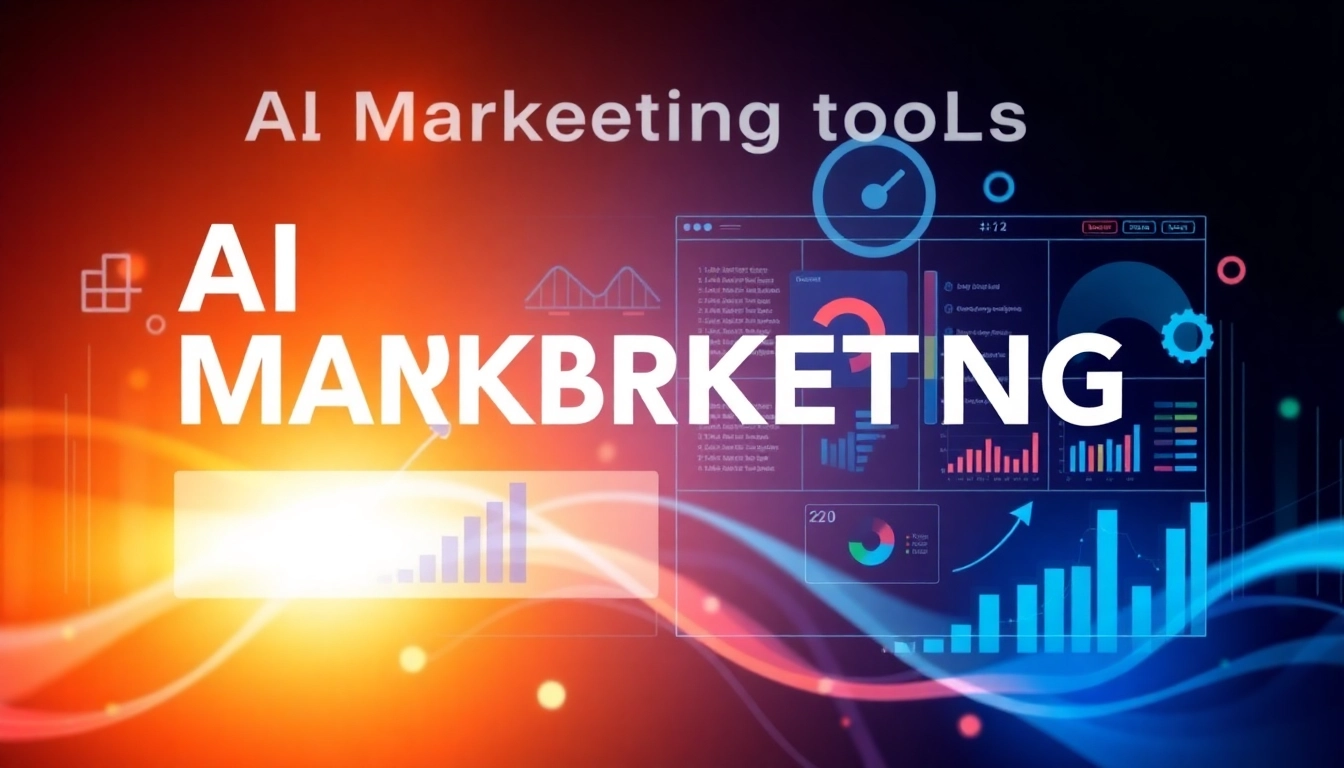Maximizing Impact with Top AI Marketing Tools for 2025

Understanding AI Marketing Tools
Definition and Purpose
AI marketing tools are software applications that leverage artificial intelligence technologies to assist businesses in automating, optimizing, and enhancing their marketing efforts. By utilizing advanced algorithms, machine learning, and data analytics, these tools can drive efficiency and unlock valuable insights. Their primary purpose is to streamline marketing processes, improve customer engagement, and generate better results across various marketing channels.
Key Benefits for Businesses
The adoption of AI marketing tools offers numerous advantages for businesses looking to stay competitive in a rapidly evolving digital landscape. Key benefits include:
- Enhanced Decision-Making: AI tools can analyze vast amounts of data and provide actionable insights, allowing marketers to make informed decisions.
- Increased Efficiency: Automation of routine tasks, such as data analysis and content creation, frees up time for marketers to focus on strategy and creativity.
- Personalization: AI enables businesses to deliver tailored messages to their audience based on behavior and preferences, leading to a better customer experience.
- Cost Savings: Reducing manual work and improving targeting through AI can lead to lower marketing costs and higher ROI.
Types of AI Marketing Tools
AI marketing tools come in various forms, each serving distinct functions within the marketing ecosystem. Some of the primary types include:
- Content Creation Tools: AI can assist in generating content, whether it’s blog posts, social media updates, or email newsletters, often optimizing for SEO as well.
- Customer Relationship Management (CRM) Tools: AI-integrated CRMs help businesses manage customer interactions by analyzing data to personalize communications and improve customer satisfaction.
- Social Media Management Tools: These tools automate posting, scheduling, and engagement on social media platforms, often utilizing AI to analyze performance and audience behavior.
- Analytics and Insights Tools: AI tools can process data to provide insights into campaign performance and customer behavior, facilitating more strategic decisions.
Leading AI Marketing Tools in 2025
Top Picks for Content Creation
As content remains king in the marketing world, AI tools are stepping up to provide innovative solutions. Key players in this category for 2025 include:
- Copy.ai: This tool uses AI to generate high-quality marketing copy across various niches in seconds, making it ideal for marketers who need to produce a lot of content quickly.
- Jasper: Known for its powerful copywriting abilities, Jasper can assist marketers in creating engaging blog posts, social media content, and email campaigns tailored to specific audiences.
- Surfer SEO: Combining SEO with content generation, Surfer SEO informs users about optimal content structure and keyword usage, ensuring that articles not only read well but also rank well.
Essential Tools for Social Media Management
Social media management has increasingly become more complex, and AI tools can help simplify the process. Effective tools for 2025 include:
- Hootsuite: This tool integrates AI to suggest post timings and content ideas based on audience engagement, helping businesses maximize their social media presence.
- Buffer: Known for its scheduling capabilities, Buffer now incorporates AI to provide insights on post performance and audience preferences, aiding in effective social media strategies.
- Pinterest Lens: Using visual search technology, this tool allows marketers to understand trending visual content and tailor their social media posts accordingly.
Analytics and Data-Driven Tools
To measure success and drive informed decisions, marketing teams rely heavily on analytics tools. Some of the best AI-powered analytics tools for 2025 are:
- Google Analytics: The powerful platform has integrated AI to provide predictive analytics, helping businesses forecast future trends based on historical data.
- Tableau: This data visualization tool leverages AI to identify patterns and insights from complex data sets, allowing marketers to make data-driven decisions effectively.
- Hotjar: This tool employs AI to analyze user behavior on websites, providing invaluable insights into visitor engagement and areas needing improvement.
How AI Enhances Marketing Strategies
Personalization and Customer Insights
One of the most significant advantages of using AI in marketing is the ability to personalize campaigns. AI tools can analyze customer data, such as purchase history and online behavior, to create personalized experiences. For instance:
- Dynamic Content: AI enables businesses to deliver dynamic content on websites and in emails tailored to individual users, significantly improving engagement rates.
- Segmentation: AI can identify specific audience segments based on various criteria, allowing for targeted marketing tactics that resonate with those groups.
- Predictive Analytics: By analyzing customer behavior and trends, AI can predict future actions, enabling marketers to proactively engage with their audience at critical moments.
Automation and Efficiency
AI tools are transforming how marketers approach their daily tasks. Automation features help streamline processes and reduce the time spent on repetitive activities:
- Email Marketing Automation: AI can automate email campaigns, including segmentation and personalization, while also optimizing send times based on past engagement.
- Ad Placement: AI algorithms can determine optimal ad placements across different platforms by analyzing metrics and adjusting in real time for better results.
- Chatbots: AI-powered chatbots are increasingly used to handle customer queries in real-time, enhancing the user experience while freeing up human resources.
Improving Campaign Performance
AI greatly impacts campaign performance, providing tools that facilitate A/B testing, performance optimization, and real-time adjustments. Key enhancements include:
- A/B Testing: AI can analyze the effectiveness of multiple campaign strategies simultaneously, allowing marketers to identify the most successful approach quickly.
- Performance Monitoring: AI tools can track campaign performance metrics and provide insights, enabling continuous optimization during campaigns.
- ROI Measurement: Enhanced tracking capabilities allow marketers to calculate the return on investment of their campaigns effectively, adjusting strategies to maximize profitability.
Implementing AI Marketing Tools
Selecting the Right Tools for Your Needs
With a plethora of AI marketing tools available, choosing the right one can be daunting. Here are some considerations to help guide the selection process:
- Business Size: Consider whether the tool is suitable for your business type and size. Small businesses may prefer user-friendly platforms with lower costs, while large enterprises might require more comprehensive tools.
- Specific Needs: Identify the specific challenges you’re facing. For example, if content creation is a priority, focus on tools specializing in automation and SEO.
- User Experience: A tool should have an intuitive interface and provide sufficient tutorials or support to ensure ease of use.
- Integration Capabilities: Check if the AI tool can seamlessly integrate with your existing systems, such as CRM or email marketing platforms.
Integration with Existing Platforms
Successful implementation of AI marketing tools often requires integrating them with existing platforms. Consider the following steps to ensure smooth integration:
- API Connectivity: Ensure the AI tool offers API connectivity to integrate with existing software effectively.
- Data Migration: When switching tools, it’s essential to migrate data without loss. Work with IT to ensure a smooth transition.
- Training: Invest time in training employees on how to use new tools efficiently, maximizing the potential for success.
Measuring Success and ROI
To assess the effectiveness of AI marketing tools, it’s crucial to establish clear metrics and KPIs. Here are ways to measure success:
- Conversion Rates: Tracking conversion rates provides a direct correlation to the effectiveness of the tools being used.
- Customer Engagement: Monitor engagement metrics, such as click-through rates and time spent on site, to gauge audience interaction driven by AI.
- Cost Per Acquisition (CPA): Analyzing how much it costs to acquire a customer through AI tools can help determine overall ROI.
The Future of AI in Marketing
Emerging Trends to Watch
As AI continues to evolve, several emerging trends are expected to shape the marketing landscape:
- Voice Search Optimization: With the rise of smart speakers and voice assistants, marketing strategies will increasingly need to adapt to voice search queries.
- Ethical AI Marketing: Consumers are becoming more aware of how their data is used. Brands will need to be transparent about AI-driven marketing practices.
- Augmented Reality (AR): AI and AR will converge, offering immersive customer experiences that enhance product interactions, fitting well in industries like retail and real estate.
Potentials and Predictions
The future of AI in marketing looks promising, with predictions including:
- Greater Personalization: As AI becomes more sophisticated, its ability to deliver hyper-personalized experiences will likely enhance customer satisfaction.
- Advanced Automation: The next generation of AI tools will likely focus on automating even more complex marketing processes, enabling marketers to devote time to creative strategy.
- Integration of AI with Other Technologies: The interplay of AI with emerging technologies such as blockchain could revolutionize transparency and security in data usage in marketing.
Preparing for Technological Advancements
To successfully navigate the future of AI in marketing, businesses should take proactive steps:
- Continuous Learning: Encourage marketing teams to stay updated on AI trends and innovations through training programs and industry events.
- Adaptability: Foster a culture that embraces change, encouraging teams to adapt strategies in response to new technologies and consumer behaviors.
- Data Stewardship: Implement robust data management practices to safeguard consumer data while benefiting from AI insights.



Leave a Comment